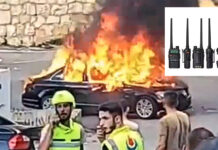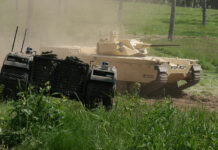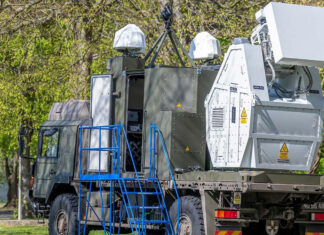Hamas planned to inaugurate a mosque, on Friday’s prayers, as its official government seat at Mahmoud Abbas’ Presidential Guard-security service compound, the Muntada, in downtown Gaza City – the last Fatah bastion to fall under Hamas’ five-day onslaught. This will symbolize the Islamist character of the national Palestinian entity supplanting the defeated Palestinian Authority. All border crossings, including the strategic ‘Philadelphi’ border post at Rafah is now firmly under Hamas control.
The European monitors have fled to safety in Israel, while the Egyptian troops in the Sinai side of the international border have sofar remained inconspicuously passive to these earthshaking events. In fact, the Force 17 commander Colonel Musbah Basichi and sixty of his compatriots have fled to Egypt already, escaping certain death by Hamas. Matters became even worse, as Hamas seized all the crossings into Israeli territory. Especially challenging could become Hamas’ control of the Karni goods crossing, over which the bulk of vital emergency supplies for 1.4 million Gazans are delivered daily. Hamas’ is now clearly challenging Israel how to react to this move- wether to co-operate and virtually recognize its “sovereignty” as de-facto ruler in the Gaza Strip, or be accused by causing a human catastrophy among the non-belligerent population. Meanwhile the fighting around the last of President Mahmoud Abbas’ Fatah last bastion in Gaza is raging relentlessly.
Thousands of Palestinian security officers loyal to Fatah are under Hamas siege at the Gaza City’s Presidential Guard compound, rapidly running out of water and ammunition. Some of their prominent leaders and their families have already tried to contact Israel, requesting urgent evacuation by sea (Gaza Port is still under Fatah control) to safety in Egypt. But with over 80% of the Gaza Strip already overrun, loyalists of the President, including complete clans, have surrendered and turned in their weapons- the battle for Gaza seems for all purposes lost. The Hamas military leadership has given Fatah forces till Friday noon to surrender their arms or become wanted men under sentence of death.
Military experts monitoring events in Gaza over the last week are surprised by the conduct of operations, which could clearly indicate guidance by professional elements, being Hezbollah, Syrian or even Iranian origin. Senior Fatah official Samir Mash’harawi has indeed accused Hamas of striving to establish, in the Gaza Strip, a small state modeled after the Taliban in Afghanistan. An Islamic fundamentalist entity, right on Egypt’s doorstep and along the Mediterranean sea, could become devastating, not only to Cairo, but to the free World itself. In fact, experts regard the present events in Gaza being the second triumph in a weeks for a Palestinian force backed by Iran and Syria. In less than one month, Islamic Fundamentalism in two Middle East sectors, remained virtually unchallenged. Arms smuggling over the Syria-Lebanon border is continuing without any control by UNIFIL under orders by UN Resolution 1701.
Fouad Siniora’s US-supported government’s troops failed to break through to the Palestinian camp Nahr al-Bared and crush the pro-Syrian uprising by a relatively small armed group. In Israel, Ehud Olmer’s government stood by, inactively watching as the most radical elements in the Middle East snatched the Gaza Strip right on Israel’s southwestern threshold.
But Lebanon and Gaza are not the only flashpoint rising to a bloody climax this week. In Iraq, a bold blow to Iraqi hopes for peace, by suspected al-Qaida bombers, toppled the towering minarets of Samarra’s revered Shiite shrine on Wednesday, adding new provocation to old wounds a year after the mosque’s Golden Dome was destroyed. The Askariya dome itself was destroyed in February 2006 in a bombing blamed on al Qaeda-linked Sunni insurgents, which sparked Iraq’s worst wave of sectarian violence. All over Sunni Iraq people are trembling for a Shi’ite revenge, which is surely coming. Almost simultaneousely, an explosion, apparently from a bomb-rigged car, rocked Beirut’s seafront Wednesday, killing an anti-Syrian lawmaker and nine others. The 65-year-old lawmaker, Walid Eido, was the seventh opponent of Damascus to be killed in two years in this conflict-ridden country. Eido’s son, two bodyguards and six others were also killed in the explosion, and eleven others were wounded.
Yesterday’s explosion was the latest in a series to hit Lebanon in the last three weeks as Lebanese troops battled Islamic militants in a Palestinian refugee camp in the northern part of the country. And a new source of potential tension is already creating as Turkey is building up its military presence on its southeastern border with Iraq. Turkey is debating whether to launch an incursion into northern Iraq to root out members of the Kurdistan Workers Party (PKK) and related Kurdish militant groups based there The PKK’s stated aim is to create a democratic and independent Kurdish state that would consist of parts of southeastern Turkey, northeastern Iraq, northeastern Syria and northwestern Iran.
In the mountainous areas of northern Iraq, the Kurds have the advantage over the Turkish military in terms of terrain, using a network of caves for shelter and rendering air attacks relatively useless if not dangerous. While the Kurdish areas of northern Iraq have enjoyed the greatest stability since the 2003 US-led invasion, the establishment of strongholds in the region’s far north by the PKK and related groups – coupled with a growing confrontation to the south over the future of the oil-rich Kirkuk area – threaten this stability with new bloodshed. But there is little more Washington can do to dissuade Turkey other than to express its displeasure at this point A key base in NATO’s southern reigon, Incirlik is situated only 12 kilometers east of Adana and 56 kilometers from the Mediterranean Sea. Some 5,000 US Air Force troops are deployed on the base, supported by Turkish military personnel. Incirlik served as main hub for missions in support for the war in Afghanistan after September 2001 and then in the invasion of Iraq in 2003 and beyond. The Turkish military and intelligence community are key strategic allies of the Pentagon, the Israeli Defense Forces and associated intelligence agencies in the growing espionage battle against Iran and these strategic relations can hardly been jeopardized in favor of the Kurds.
So, in the meantime the Middle East is going up in flames as fighting flares up on no less than four Flashpoints. The astounding victory of Hamas in Gaza will have a contagious effect on the entire region and especially on the moderates like Egypt, Jordan and even Saudi arabia. The creation of “Hamastan” preceived as another victory of “Islamic fundamentalism on the march” after last year’s Lebanon Fiasco, will reverberate all over the area and could even affect Islamic elements inside Israel. An international force is not only ineffective, but also totally superflous. The real key to this tragedy is in Cairo and only President Hosni Mubarak can still save the situation. By all means, the present situation should in fact serve as a last minute “wake-up” call to shake-up Egypt into action before it is too late to save Gaza from becoming a dangerous Islamic fundamentalist Taliban like mini-state. By issuing strict and undisputable orders to close the so-called ‘Philadelphi’ border line – only 11 kilometer ( 6,5 miles) long- will eventually, once effectively controlled, shut-down the Iranian-sponsored Hamas al Qaeda-Hezbollah lifeline, blocking once and for all all, access to weapons, ammunition and financial aid- a move, which will eventually “starve” the fighting potential and then enable an international force to enter into a fairly relative safe environment to restore some sort of orderly administration under a UN framework. But only a concerted effort effort by a sane leadership, emanating unflinching determination, not to let things happen Ahmadinejad’s way, can still prevent the Middle East becoming a hornet’s nest for his Islamic fundamentalist terrorism ambitions and only a determined action displayed, without further hesitation, can save the egion turning into a catastrophy.
Unfortunately, as it seems, the UN secretary-general Ban Ki-moon, is far from acting as a decisive element to curb the spiralling violence in the turbulent Middle East. Reacting to the urgent demand to send a United Nations”Peacekeeping” force to Gaza, Ban Ki moon had only this to say: “This is an idea we need to explore,” the UN secretary-general, said on Wednesday, adding, that he had held preliminary discussions about the idea with members of the UN Security Council.I need to consider more in detail with the countries concerned. In this way, any UN reaction would seem like “shutting the barn door after the horses have already bolted”!
For earlier analysis on the situation in Gaza please check:
- Shattered cease-fire sends Gaza spiraling into Civil War
- Post Arafat: Two Palestinian Entities
- Inner strife splits Gaza from West Bank
- Hamastan Gaza- to become a Wahhabist Outpost?
- Military Confrontation with Hamas in Gaza Unavoidable
- Al Qaeda spurs Gaza carnage to create Hamastan
Also from David Eshel – 1967 Six Days War Retrospect:
How the Kremlin Manipulated the 1967 War to the Brink of Nuclear Conflict
















